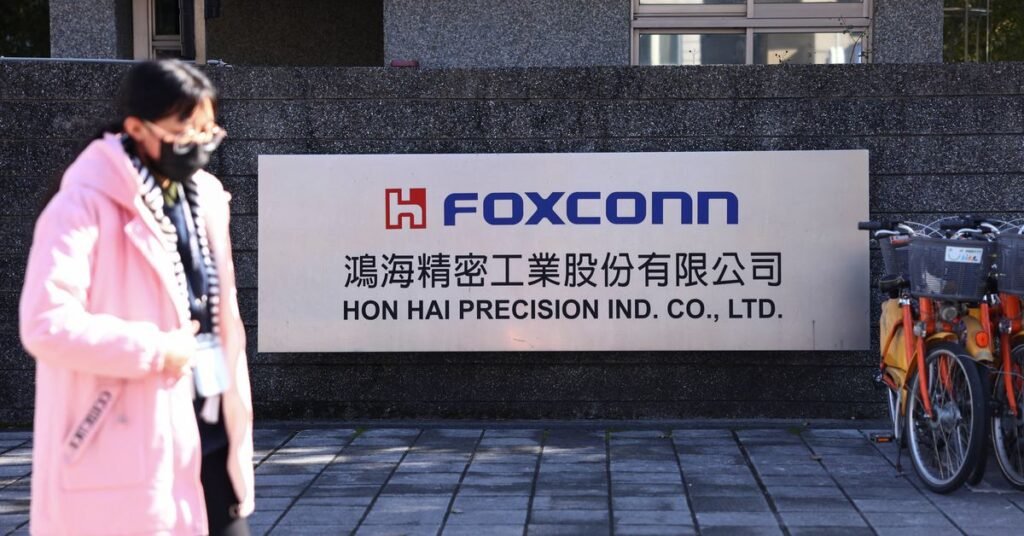[1/2]FILE PHOTO-A lady walks previous the brand of Foxconn exterior an organization's constructing, in New Taipe Metropolis, Taiwan December 22, 2022. REUTERS/Annabelle Chih/file picture
TAIPEI/BENGALURU, July 10 (Reuters) – Taiwan's Foxconn has withdrawn from a $19.5 billion semiconductor three way partnership with Indian metals-to-oil conglomerate Vedanta, it mentioned on Monday, in a setback to Prime Minister Narendra Modi's chipmaking plans for India.
The world's largest contract electronics maker signed a pact with Vedanta last year to arrange semiconductor and show manufacturing crops in Modi's residence state of Gujarat.
“Foxconn (2354.TW) has decided it won't transfer ahead on the three way partnership with Vedanta,” a Foxconn assertion mentioned with out elaborating on the explanations.
The corporate mentioned it had labored with Vedanta for greater than a 12 months to convey “a fantastic semiconductor concept to actuality”, however they'd mutually determined to finish the three way partnership and it'll take away its title from an entity that's now absolutely owned by Vedanta.
Vedanta mentioned it's absolutely dedicated to its semiconductor challenge and had “lined up different companions to arrange India’s first foundry”. “Vedanta has redoubled its efforts” to fulfil Modi's imaginative and prescient, it added in a press release.
A supply conversant in the matter mentioned considerations about incentive approval delays by India's authorities had contributed to Foxconn's choice to drag out of the enterprise. New Delhi had additionally raised a number of questions on the price estimates supplied to request incentives from the federal government, the supply added.
Modi has made chipmaking a prime precedence for India's financial technique in pursuit of a “new period” in electronics manufacturing and Foxconn's transfer represents a blow to his ambitions of luring overseas buyers to make chips domestically for the primary time.
“This deal falling by way of is certainly a setback for the ‘Make in India’ push,” mentioned Neil Shah, Vice President of analysis at Counterpoint, including that it additionally doesn't replicate properly on Vedanta and “raises eyebrows and doubts for different corporations”.
Deputy IT minister Rajeev Chandrasekhar mentioned Foxconn's choice had “no impression” on India's plans, including that each corporations had been “valued buyers” within the nation.
He mentioned it was not for the federal government to “get into why or how two personal corporations select to associate or select to not”.
‘IMPORTANT STEP'
Foxconn is greatest recognized for assembling iPhones and different Apple (AAPL.O) merchandise however in recent times it has been increasing into chips to diversify its enterprise.
A lot of the world's chip output is restricted to some nations, akin to Taiwan, with India a late entrant. The Vedanta-Foxconn enterprise introduced its chipmaking plans in Gujarat final September, with Modi calling the challenge “an vital step” in boosting India's chipmaking ambitions.
However his plan had been gradual to take off. Amongst different issues encountered by the Vedanta-Foxconn challenge had been deadlocked talks to contain European chipmaker STMicroelectronics (STMPA.PA) as a tech associate, Reuters has beforehand reported.
Whereas Vedanta-Foxconn managed to get STMicro on board for licensing know-how, India's authorities had made clear it wished the European firm to have extra “pores and skin within the sport”, akin to a stake within the partnership.
STMicro was not eager on that and the talks remained in limbo, a supply has mentioned.
The Indian authorities has mentioned it stays assured of attracting buyers for chipmaking. Micron final month mentioned it's going to make investments as much as $825 million in a chip testing and packaging unit, not for manufacturing. With help from India's federal authorities and the state of Gujarat, the full funding will likely be $2.75 billion.
India, which expects its semiconductor market to be price $63 billion by 2026, final 12 months obtained three functions to arrange crops beneath a $10 billion incentive scheme.
These had been from the Vedanta-Foxconn three way partnership, Singapore-based IGSS Ventures and international consortium ISMC, which counts Tower Semiconductor (TSEM.TA) as a tech associate.
The $3 billion ISMC challenge has stalled, too, owing to Tower being acquired by Intel, whereas one other $3 billion plan by IGSS was additionally halted as a result of it wished to re-submit its utility.
India has re-invited functions for the inducement scheme from corporations.
Reporting by Munsif Vengattil in Bengaluru, Ben Blanchard in Taipei, Aditya Kalra in New Delhi; Further reporting by Rishika Sadam; Modifying by David Goodman and Alexander Smith
: .

